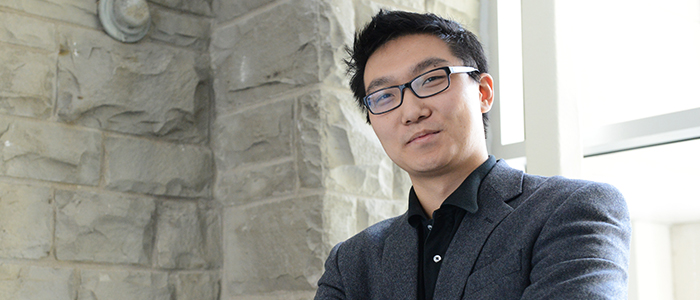Seeing double: Taking on the MD/PhD program

Charles Yin was only in the tenth grade when he completed his first research project with the Department of Biochemistry. Since then, Yin has continued to embrace his love of research by completing his undergraduate degree in Integrated Science at McMaster University, and working on a number of research projects and publications.
Now in his first year of Schulich Medicine & Dentistry’s MD/PhD, is looking forward to what the seven-year journey ahead of him will bring, and is excited to unlock the enormous potential of combining medicine and research.
Tell me about your background.
I actually spent most of my later childhood growing up in London after moving here from China in 2000. In high school, I had the opportunity to complete a project with Dr. Richard Rozmahel in the Department of Biochemistry, and then had a co-op position with Dr. Greg Gloor in the Department of Biochemistry.
From there, I completed my undergraduate degree in Integrated Science with a concentration in Biochemistry and Biomedical Sciences at McMaster University, where I completed an undergraduate honours thesis in macrophage cell biology.
Have you always been interested in working on biomedical research?
Once I was going through my undergraduate degree, I knew for sure that was what I wanted to do. But as I did more of it, one thing that particularly frustrated me about research was the lack of immediate progress that you could see — the lack of applicability. You’re doing something that could have a significant impact later on, but almost nothing in research is immediate. I felt myself lacking that kind of satisfaction of seeing immediate benefit from my work, which is why I decided to look into medicine as well. It’s a way of applying research to benefit people and you can see tangible results much quicker.
Why did you choose to complete the MD/PhD program at Schulich Medicine & Dentistry?
I guess it has to do with the fact that I grew up in London — my family is here, and I am familiar with the campus. Western University is also where I got my start in research, so there is a certain nostalgic value.
Schulich Medicine & Dentistry also has a very strong Microbiology and Immunology program, and I have been very impressed by the quality of work being completed here.
Can you describe the MD/PhD program model? And what stage are you at in the program?
There are two models of the MD/PhD program at Schulich Medicine & Dentistry. I am completing the “two-three-two” model — two years of pre-clerkship medicine, three years of PhD work, and two years clerkship medicine.
I’m currently in my first year of the program. My anticipated graduation date is 2021.
Have you already determined what you will be working on for the PhD portion of the program?
For my PhD, I will be working with Dr. Bryan Heit in the Department of Microbiology and Immunology on research that involves the fundamental cell biology of macrophages, which are a type of cell in the immune system that is an integral part of what’s called the innate immune system, or your body’s first line defence against pathogens. We are interested in looking at how macrophages differentiate between bacteria and host debris, because macrophages internalize and kill bacteria and also help clear cellular debris.
I will be applying Dr. Heit’s basic fundamental research into the process of atherosclerosis, a disease in which plaque builds up in a patient’s arteries.
How did you prepare for Interview Weekend?
My philosophy is that there is such a thing as over preparing. You can try to predict what kind of questions you’ll be asked, and prepare your stock answers, but you don’t want to get completely blindsided if the interviewers ask you something you weren’t expecting. I think it’s more important to actually practice the process of the interview, rather than the content you might be asked.
Once you graduate from the MD/PhD program, what are your future aspirations?
As an immunologist, I’m consistently amazed at the amount of progress we've seen in this field. We now know so much more about human immunity, but much still remains to be done. There have been tremendous advances in our understanding of the immune system's role in the pathogenesis of several major diseases. As a clinician-scientist, I hope to be in a position to apply this new understanding in developing novel means of diagnosing and treating patients in the clinic.








